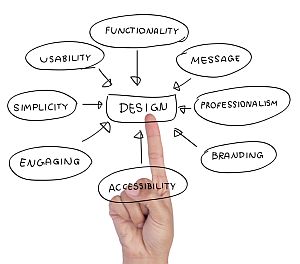There’s a lot that goes into creating a website and it’s important to understand the characteristics that can make or break the effectiveness of your online investment. An unattractive or poorly built site will do more to hurt your business than to help it.
75% of users admit to making judgments about a company’s credibility based on their website design.
In this article, we look at some of the general components involved in making a website successful.
Some Key Elements Of An Effective Website:
1. Appearance or User Interface (UI)
Your website may be the first, and only, impression a potential customer receives of your company. Remember, it’s reflecting your company, your products and your services. Websites that are perceived as great looking are also perceived as usable and trustworthy.
- The site’s colors should convey your company’s personality or brand. Colors have a big emotional factor so it’s important to choose colors your audience will love.
- The fonts need to be easy to read.
- Choose pictures and graphics that display your company and products in the best light possible. Images speak volumes about your company and play a key role in your website’s look and feel.
- Strive for simplicity in your design. Keep it simple and allow for adequate white space. Uncluttered layouts allow viewers to focus on your message.
2. Website Usability or User Experience (UX)
A critical, but often overlooked component of a successful website is its degree of usability. Your site must be easy to read, navigate, and understand. Some key usability elements include:
- Simplicity: The best way to keep visitors glued to your site is through valuable content, good organization and attractive design. Keep your site simple and well organized.
- Fast-loading pages: A page should load in a few seconds; at more than that, you’ll lose more than half of your potential visitors.
- Minimal scroll: This is particularly important on the first page. Create links from the main page to read more about a particular topic
- Consistent layout: Site layout is extremely important for usability. Use a consistent layout and repeat certain elements throughout the site.
- Prominent, logical navigation: Place your menu items at the top of your site, or above the fold on either side. Limit your menu items to 10 or fewer. Remember, your visitors are in a hurry – don’t make them hunt for information.
- Cross-platform/browser compatibility: Different browsers often have different rules for displaying content. At a minimum, you should test your site in the latest versions of Internet Explorer (currently, version 9 and above), as well as Chrome, Firefox and Safari.
- Multi-Screen/ Device compatibility: Today, the average web surfer uses a laptop, tablet as well as a mobile to consume information. You need to make sure that what looks good on a desktop will also work nicely for other devices.
3. Content/ Copy
Along with style, your site must have substance. Remember that your audience is looking for information that will help them make a decision, so it should be informative and relevant. Use this opportunity to increase visitor confidence in your company’s knowledge and competence.
- Short and organized copy: Clearly label topics and break your text up into small paragraphs. You’ve got less than 10 seconds to hook your visitors, so grab their attention by being clear, concise and compelling.
- Speak to your visitors: Use the word YOU as much as possible. Minimize the use of I, we and us. Remember you need to make an emotional connect with your website visitor.
- Consider a pro: Unless you’re an especially good writer, consider using a professional to write or edit your text content.
4. Functionality
Every component of your site should work quickly and correctly. Broken or poorly constructed components will only leave your visitors frustrated and disillusioned with your company. Across the spectrum, everything should work as expected, including hyperlinks, contact forms, site search, event registration, and so on.
Error-free copy: Remember the exposure your website will get. Double-check your facts and figures. Spelling mistakes and bad grammar are as unforgivable on a website as they are in other company materials.
The most effective website will reflect best practices across all of these elements.
We’ve barely scratched the surface of what makes a website most effectively. However, by following these simple guidelines, you will be headed in the right direction.
If you have more questions or your current website lacks in any of the above areas, simply contact Argience here and we can talk about it in more detail.

